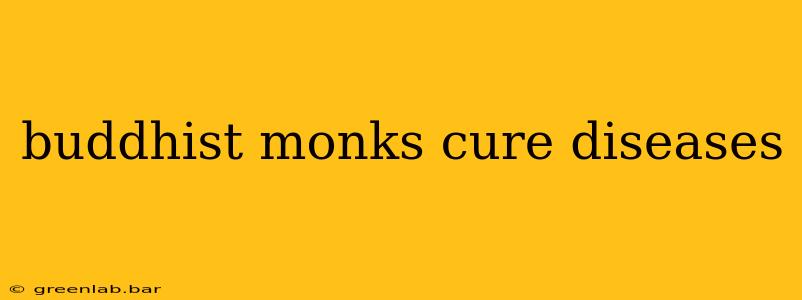Can Buddhist Monks Cure Diseases? Exploring the Interplay of Faith, Practice, and Modern Medicine
The question of whether Buddhist monks can cure diseases is complex and requires a nuanced understanding of Buddhist philosophy, traditional healing practices, and modern medicine. While Buddhist monks don't possess supernatural healing powers in the way some might imagine, the impact of their practices on health and well-being is a subject worthy of exploration. This article delves into the various aspects of this intriguing question.
The Role of Mindfulness and Meditation in Health
Buddhist practices, particularly mindfulness meditation and mindful movement like Tai Chi or Qigong, often associated with Buddhist traditions, have been shown to have significant positive effects on physical and mental health. Numerous scientific studies demonstrate their effectiveness in reducing stress, lowering blood pressure, improving sleep quality, and even boosting the immune system. These benefits are not "cures" in the traditional medical sense, but they can significantly improve one's overall health and resilience to illness.
How Mindfulness Impacts Health:
- Stress Reduction: Chronic stress weakens the immune system and contributes to various health problems. Mindfulness techniques help regulate the body's stress response, mitigating these negative effects.
- Improved Sleep: Meditation promotes relaxation and reduces racing thoughts, leading to better sleep quality, crucial for physical and mental restoration.
- Pain Management: Mindfulness practices can help individuals manage chronic pain by changing their relationship with their sensations and reducing emotional reactivity.
- Enhanced Immune Function: Studies suggest that mindfulness can modulate the immune system, potentially increasing its ability to fight off infections.
Traditional Tibetan Medicine and its Connection to Buddhism
Tibetan medicine, deeply intertwined with Buddhist philosophy, offers a holistic approach to healing. It emphasizes the interconnectedness of mind, body, and spirit, employing herbal remedies, acupuncture, and other therapies. While Tibetan medicine is a complex system with its own set of principles and efficacy, it's important to note that its effectiveness is still under scientific investigation, and it shouldn't replace modern medical care.
Important Considerations Regarding Traditional Tibetan Medicine:
- Holistic Approach: Tibetan medicine considers the individual's entire being when addressing illness, focusing on restoring balance and harmony.
- Herbal Remedies: A wide array of herbs and plants are used in Tibetan medicine, some of which have demonstrated medicinal properties in scientific research.
- Not a Replacement for Modern Medicine: While Tibetan medicine may offer complementary benefits, it shouldn't replace diagnosis and treatment by qualified medical professionals.
The Placebo Effect and the Power of Belief
The placebo effect, the improvement in a patient's condition following a treatment with no inherent medicinal properties, plays a significant role in the perceived healing powers of any practitioner, including Buddhist monks. Faith, belief in the healer, and the positive expectation of healing can profoundly influence the body's healing response. This doesn't diminish the potential benefits of mindfulness and meditation but highlights the complexity of human health and healing.
Conclusion: A Balanced Perspective
While Buddhist monks do not possess magical healing abilities, their practices, combined with the holistic principles of traditional medicine systems like Tibetan medicine and the power of belief, can contribute to improved health and well-being. It is crucial to maintain a balanced perspective: mindfulness and meditation are valuable tools for promoting health, but they should complement, not replace, modern medical care. Always seek professional medical advice for diagnosis and treatment of any illness. The integration of faith, practice, and modern medicine offers the most comprehensive approach to well-being.

